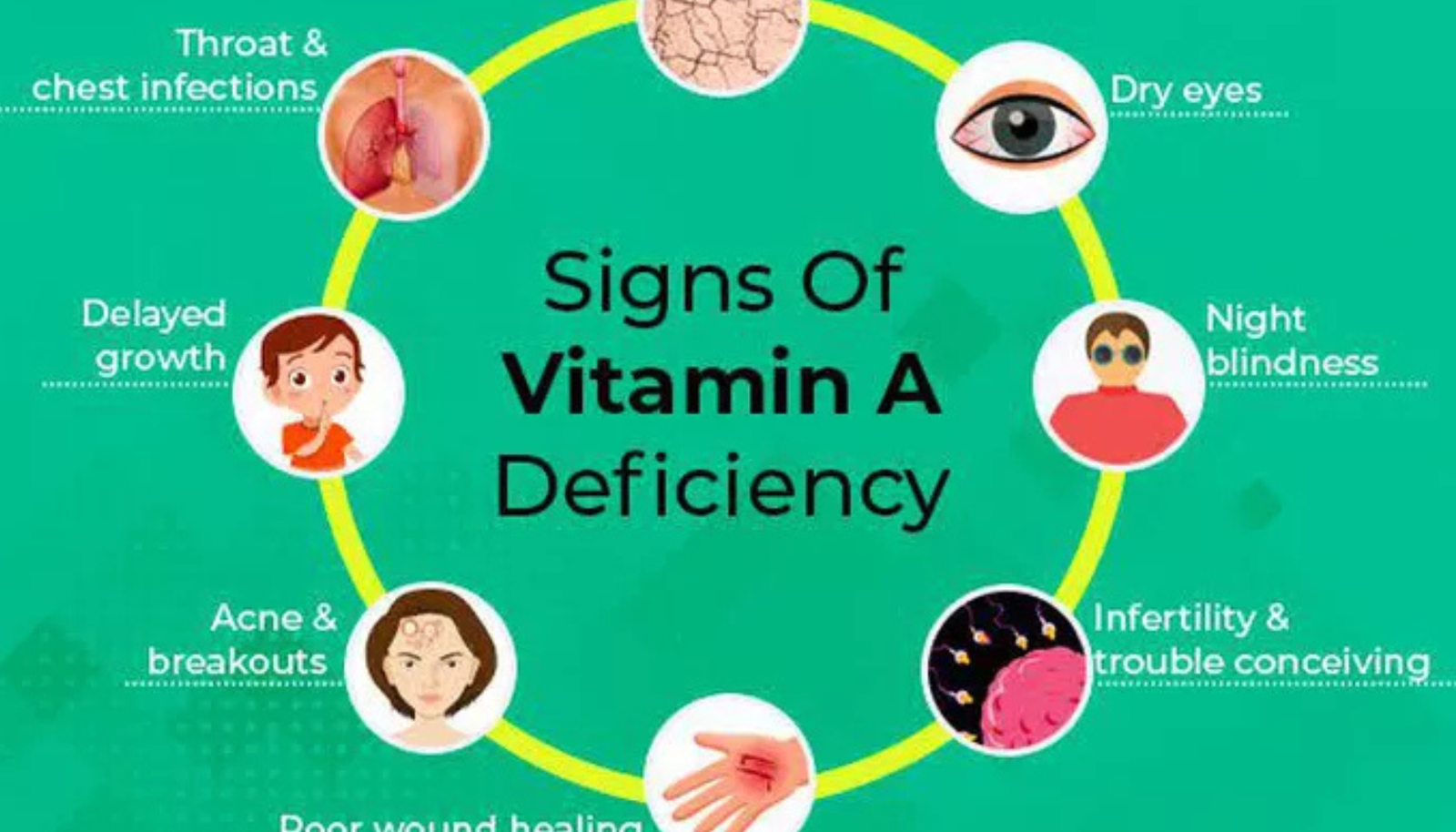Never Ignore Early Signs Of Vitamin A Deficiency
Vitamin A is one of the essential fat-soluble vitamins your body needs to function properly. It plays a crucial role in maintaining healthy vision, immune function, skin integrity, reproduction, and cellular communication.
While a severe deficiency can lead to serious complications such as blindness, the early signs of vitamin A deficiency often go unnoticed—until it becomes a much larger health issue.
Recognizing the early symptoms of vitamin A deficiency can help you take proactive steps to correct the imbalance and protect your long-term health.
Why Is Vitamin A So Important?
Vitamin A exists in two primary forms: preformed vitamin A (retinol and retinyl esters found in animal products) and provitamin A carotenoids (such as beta-carotene found in plant-based foods).
This vitamin is vital for:
- Eye health and night vision
- Supporting the immune system
- Promoting healthy skin and cell regeneration
- Reproductive health
- Reducing inflammation
A deficiency, even in mild stages, can negatively affect multiple body systems. This is why early detection is key.
Who Is at Risk of Vitamin A Deficiency?
Although vitamin A deficiency is more common in developing countries due to malnutrition, it can also occur in developed regions due to poor dietary choices or medical conditions that impair nutrient absorption.
High-risk groups include:
- Infants and children (especially those not breastfed or with poor diets)
- Pregnant and lactating women
- People with gastrointestinal disorders like Crohn’s disease, celiac disease, or pancreatic insufficiency
- Individuals with liver disorders
- Vegetarians or vegans who don’t consume enough carotenoid-rich foods
- People undergoing weight-loss surgeries or on restrictive diets.
Early Signs of Vitamin A Deficiency
Vitamin A deficiency doesn’t always manifest in dramatic ways at first. However, there are several subtle but significant early signs you should look out for:

1. Night Blindness
One of the earliest and most recognizable symptoms of vitamin A deficiency is difficulty seeing in low light or darkness, also known as nyctalopia.
Vitamin A is a critical component of rhodopsin, a protein in the eye that allows you to see in dim lighting. A lack of this vitamin leads to delayed adaptation to darkness and poor night vision.
If you struggle to see when transitioning from bright to dim environments, this may be an early red flag.
2. Dry Eyes (Xerophthalmia)
Vitamin A helps in the production of tears, which are essential for maintaining moisture in the eyes. A deficiency can result in dry, itchy, or irritated eyes.
If left untreated, dryness can progress to corneal ulcers, scarring, and eventually blindness. That’s why even mild eye discomfort should not be ignored.
Continue reading: 7 Best Diet Tips To Keep Eyesight Sharp
3. Frequent Infections
Vitamin A plays a pivotal role in immune system regulation. It helps maintain mucous membranes in the respiratory, urinary, and intestinal tracts, acting as a barrier against infections.
If you find yourself getting sick often, especially with respiratory or gastrointestinal infections, it may signal an underlying deficiency.
4. Dry, Flaky, or Rough Skin
Another early indicator of vitamin A deficiency is skin dryness, flakiness, or rough patches, particularly on the arms, thighs, and back.
Vitamin A supports skin cell turnover and sebum production, which keeps your skin moisturized and healthy. Without it, your skin may become bumpy or develop a condition called follicular hyperkeratosis, where hair follicles become clogged with keratin.
5. Delayed Wound Healing
Slow or impaired wound healing is a lesser-known but important sign of vitamin A deficiency. The vitamin promotes cell growth and repair, particularly in the skin and tissues.
If cuts or injuries take longer than usual to heal, it might indicate a problem with your nutrient levels.
Also read: 6 Fruits To Increase Platelet Count Naturally
6. Hair Problems
Vitamin A helps produce sebum, an oily substance that moisturizes your scalp and keeps hair healthy. A lack of it can lead to dry scalp, brittle hair, or hair loss.
Though hair loss has multiple causes, a nutritional deficiency should always be considered when evaluating the root cause.
7. Fatigue and Weakness
Persistent fatigue, low energy, or feeling weak without a clear cause could be linked to vitamin A deficiency. The nutrient is involved in the body’s energy production, oxygen transport, and immune function.
When these systems aren’t working efficiently, you may feel chronically tired, even with adequate rest.
8. Reproductive Issues
In both men and women, vitamin A deficiency can lead to fertility issues. In pregnant women, it’s associated with birth defects, poor fetal development, and a higher risk of maternal death during childbirth.
9. Throat and Chest Infections
Frequent episodes of sore throat, bronchitis, or other respiratory problems may occur due to weakened mucous linings. Vitamin A helps maintain the health of epithelial tissues that defend against pathogens.
10. Stunted Growth in Children
In children, one of the more serious early signs of vitamin A deficiency is impaired growth and development. The nutrient is essential for bone development and tissue repair.
If a child appears underdeveloped or shorter than peers, a nutritional check, including vitamin A levels, may be warranted.
Causes of Vitamin A Deficiency
- Vitamin A deficiency can result from multiple factors, including:
- Inadequate dietary intake (especially in vegetarian or vegan diets)
- Chronic diarrhea
- Fat malabsorption syndromes
- Liver disease
- Alcoholism
- Zinc deficiency (zinc is needed to transport vitamin A)
How Is Vitamin A Deficiency Diagnosed?
A healthcare provider will typically evaluate your symptoms and ask about your diet and lifestyle. Lab tests such as serum retinol levels or conjunctival impression cytology may be done to confirm the diagnosis.
In some cases, liver function tests or fat absorption studies may also be required.
Natural Ways to Boost Your Vitamin A Levels
Fortunately, you can correct vitamin A deficiency with the right dietary changes and supplementation (if needed). Here’s how:

1. Eat Animal-Based Sources of Vitamin A
- Preformed vitamin A is the most bioavailable form. Rich sources include:
- Liver (beef, chicken, or cod liver oil)
- Egg yolks
- Butter
- Cheese
- Whole milk
- Fish like salmon, mackerel, or tuna.
2. Eat Colorful Fruits and Vegetables
Carotenoids (provitamin A) are found in:
- Carrots
- Sweet potatoes
- Pumpkins
- Mangoes
- Spinach
- Kale
- Red bell peppers
- Butternut squash
These plant-based sources are especially important for vegetarians and vegans.
3. Pair Carotenoids with Healthy Fats
Since vitamin A is fat-soluble, your body absorbs it better when consumed with healthy fats like:
- Avocados
- Nuts
- Olive oil
- Seeds
For example, drizzle olive oil over steamed carrots or add avocado to your spinach salad.
4. Consider Supplements (If Needed)
If your deficiency is moderate to severe, your doctor may recommend vitamin A supplements in the form of retinyl palmitate or beta-carotene.
Important: Over-supplementation of vitamin A can lead to toxicity. Always follow medical advice before taking supplements.
When to See a Doctor
If you suspect a vitamin A deficiency based on the symptoms above, consult a healthcare provider. Early intervention can prevent serious complications such as:
- Permanent vision loss
- Severe skin disorders
- Weakened immune system
- Increased infection risk
- Developmental delays in children.
Vitamin A deficiency can sneak up silently and impact various aspects of your health—from your eyes to your skin, immune system, and even energy levels. While more common in developing nations, this deficiency still exists in modern societies due to poor diet or absorption issues.
By recognizing the early signs of vitamin A deficiency and making nutritional changes or seeking medical advice, you can protect your health and avoid long-term damage. Make vitamin A-rich foods a regular part of your diet and monitor your symptoms closely—your body will thank you.
FAQs About Vitamin A Deficiency
1. Can you reverse vitamin A deficiency naturally?
Yes, mild to moderate deficiencies can be reversed through dietary changes by increasing intake of vitamin A-rich foods or using supplements as prescribed.
2. Is vitamin A deficiency dangerous?
If left untreated, it can cause serious health issues like blindness, infections, and reproductive problems.
3. How long does it take to recover from vitamin A deficiency?
With proper treatment, symptoms can begin to improve within a few weeks. Full recovery depends on the severity and duration of the deficiency.
4. Is vitamin A safe to take every day?
Yes, but excess intake (especially from supplements) can be toxic. Always follow recommended daily intake and consult a doctor before starting supplements.




